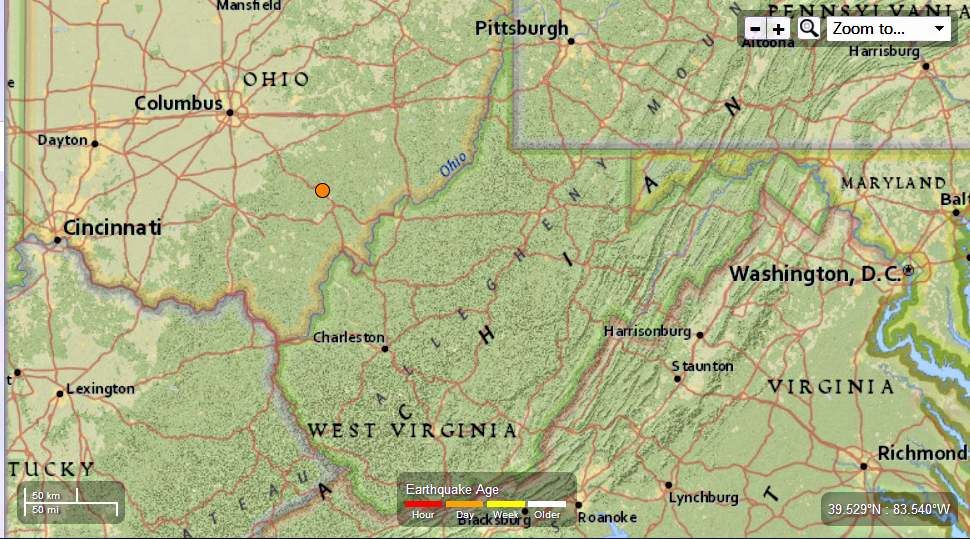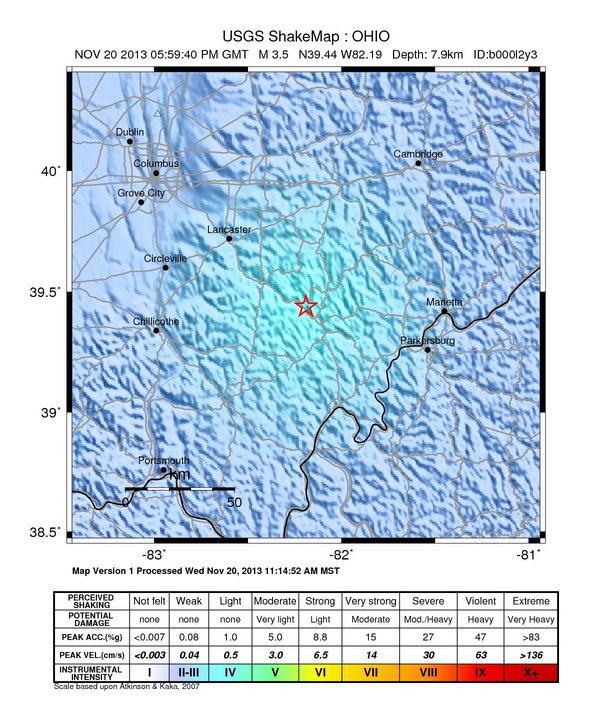Published on Nov 20, 2013
Following the Scotia Sea Activity, we will see these quakes in new locations!
http://quakes.globalincidentmap.com/
http://www.wcpo.com/news/state/state-...
..........
Examiner.com
Earthquake Ohio: 3.5 magnitude earthquake strikes southeastern Ohio
November 20, 2013
Ohio earthquake news came from the southeastern part of the state on Wednesday (Nov. 20). The Ohio earthquake was near Athens,
where students at the university there immediately reacted on Twitter.
Many OU students were trying to figure out what had happened and it
spurred quite a few online discussions. According to a report from The Columbus Dispatch, the U.S. Geological Survey reported it measured in at a 3.5-magnitude.
..........
M 3.5 - 4km ESE of Nelsonville, Ohio
2013-11-20 17:59:40 UTC

Event Time
- 2013-11-20 17:59:40 UTC
- 2013-11-20 12:59:40 UTC-05:00 at epicenter
- 2013-11-20 11:59:40 UTC-06:00 system time
Location
39.439°N 82.190°W depth=7.9km (4.9mi)
Nearby Cities
- 4km (2mi) ESE of Nelsonville, Ohio
- 14km (9mi) NNW of Athens, Ohio
- 46km (29mi) SE of Lancaster, Ohio
- 56km (35mi) WNW of Vienna, West Virginia
- 90km (56mi) SE of Columbus, Ohio
..........
Tectonic Summary
Earthquakes in the Stable Continental Region
Most of North America east of the Rocky Mountains has infrequent
earthquakes. Here and there earthquakes are more numerous, for example
in the New Madrid seismic zone centered on southeastern Missouri, in the
Charlevoix-Kamouraska seismic zone of eastern Quebec, in New England,
in the New York - Philadelphia - Wilmington urban corridor, and
elsewhere. However, most of the enormous region from the Rockies to the
Atlantic can go years without an earthquake large enough to be felt, and
several U.S. states have never reported a damaging earthquake. The
earthquakes that do occur can strike anywhere at irregular intervals.
Earthquakes east of the Rocky Mountains, although less frequent than
in the West, are typically felt over a much broader region. East of the
Rockies, an earthquake can be felt over an area as much as ten times
larger than a similar magnitude earthquake on the west coast. A
magnitude 4.0 eastern U.S. earthquake typically can be felt at many
places as far as 100 km (60 mi) from where it occurred, and it
infrequently causes damage near its source. A magnitude 5.5 eastern U.S.
earthquake usually can be felt as far as 500 km (300 mi) from where it
occurred, and sometimes causes damage as far away as 40 km (25 mi).
Faults
Earthquakes everywhere occur on faults within bedrock, usually miles
deep. Most of the region's bedrock was formed as several generations of
mountains rose and were eroded down again over the last billion or so
years.
At well-studied plate boundaries like the San Andreas
fault system in California, often scientists can determine the specific
fault that is responsible for an earthquake. In contrast, east of the
Rocky Mountains this is rarely the case. All parts of this vast region
are far from the nearest plate boundaries, which, for the U.S., are to
the east in the center of the Atlantic Ocean, to the south in the
Caribbean Sea, and to the west in California and offshore from
Washington and Oregon. The region is laced with known faults but
numerous smaller or deeply buried faults remain undetected. Even most of
the known faults are poorly located at earthquake depths. Accordingly,
few earthquakes east of the Rockies can be linked to named faults. It is
difficult to determine if a known fault is still active and could slip
and cause an earthquake. In most areas east of the Rockies, the best
guide to earthquake hazards is the earthquakes themselves.
..........
..........

..........












Comments